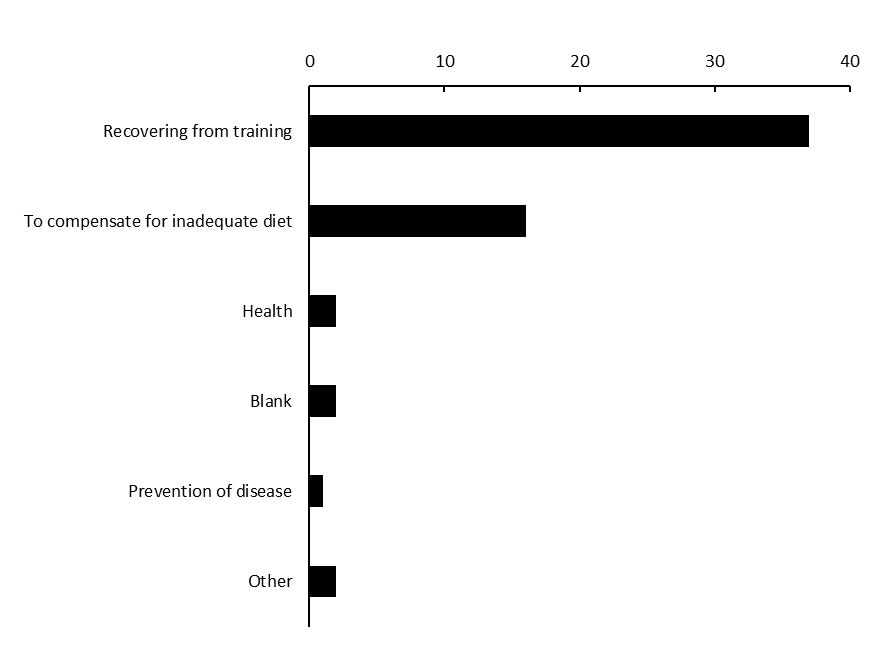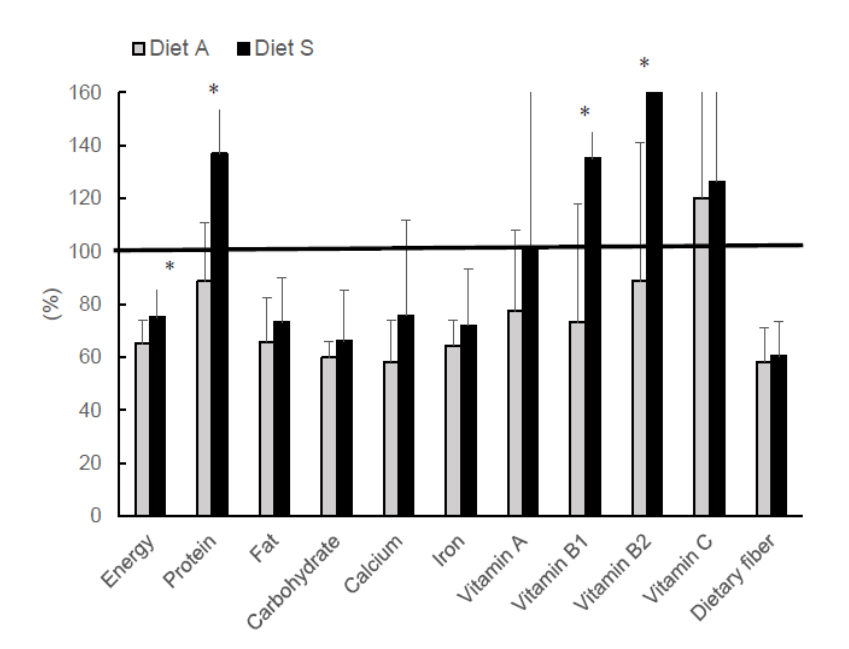University Soccer Players Using Supplements Correctly?
Ryunosuke Takahashi1, Takako Fujii2*
1The Institute of Health and Sports Science, Chuo University, Tokyo, Japan
2Department of Sports and Medical Science, Kokushikan University, Tokyo, Japan
*Corresponding Author: Takako Fujii, Department of Sports and Medical Science, Kokushikan University, Tokyo, Japan.
Received: 29 February 2024; Accepted: 06 March 2024; Published: 12 March 2024
Article Information
Citation: Ryunosuke Takahashi, Takako Fujii. University Soccer Players Using Supplements Correctly?. Journal of Orthopedics and Sports Medicine. 6 (2024): 38-42.
View / Download Pdf Share at FacebookAbstract
A proper diet is a factor necessary for athletes to maintain and improve their health and performance. Supplements have become an inseparable part of athletes’ diets. Studies have shown that athletes in events requiring endurance use more supplements than athletes in other sports. Many studies have shown that athletes report using a variety of supplements, with vitamins, proteins, and amino acids being widely used.
However, a mismatch between reasons for supplement use and products has been reported, especially among younger athletes. Given the above, we examined the use of supplements by university athletes and assessed whether or not the reasons for their use were appropriate. Sixty of the 80 athletes (75%) were taking supplements. Protein was the most common supplement consumed by athletes, followed by multivitamins, multivitamins/minerals, and jelly drinks. Of the 53 players taking proteins, 41 were only taking proteins. University athletes are not largely wrong with regard to the purpose and use of supplements. However, they do not receive sufficient energy, minerals, and other nutrients from their diets and supplements, suggesting that they do not use supplements based on an understanding of what is lacking in their diet. Athletes need to be educated on nutrition so that they can understand their own diet and use supplements as a way to improve their deficiencies.
Keywords
<p>University soccer players; Diet; Supplements; Athletes</p>
Article Details
1. Introduction
A proper diet is a factor necessary for athletes to maintain and improve their health and performance. The basis of an athlete's diet is three meals, which should provide energy and necessary nutrients, and any deficiencies should be managed with supplements. Particularly for junior athletes, a full diet will lead to healthy growth and development in the future [1].
Supplements have become an inseparable part of athletes’ diets. Regarding supplement use among athletes, Tscholl et al. [2] reported in a survey of 3887 top athletes that 67% took some type of supplement daily, and more than 30% took multiple nutrient supplements. Many studies have also reported relatively high supplement use among athletes, with Garthe et al. reporting that 40%-100% of athletes use supplements [3-6]. Lun et al. [6] reported an association between weekly training time and supplement use. They found that 67% of athletes who trained <5 h/week used supplements, as did 95% of those who trained >25 h/week.
Studies have shown that athletes in events requiring endurance use more supplements than athletes in other sports [4,6-8]. Many studies have shown that athletes report using a variety of supplements, with vitamins, proteins, and amino acids being widely used [9-11]. The frequency of protein powder (protein) intake has increased every year over the past 30 years, with usage starting at younger and younger ages [12].
However, a mismatch between reasons for supplement use and products has been reported, especially among younger athletes [3,13-16]. Heikkinen et al. [4] reported that only 27% of 372 elite athletes in Finland had the opportunity to consult a sports nutrition specialist [17]. Even when they had the chance, not all athletes consulted an expert, preferring instead to obtain nutritional advice from sources they already trusted [18]. Of 32 international-level junior track and field athletes, 72% reported that they had been able to consult with a sports nutritionist but had chosen not to, with coaches (65%) having the greatest influence on their decisions regarding supplement use while physicians (25%) and sports nutritionists (30%) were less important [19].
Given the above, we examined the use of supplements by university athletes and assessed whether or not the reasons for their use were appropriate.
2. Subjects and Methods
This study was conducted on 80 athletes belonging to a university soccer team. Prior to the experiment, the subjects were fully informed of the research outline and methods, and their written consent to participate in the study was obtained.
Participants responded to a questionnaire regarding supplements (use of supplements, supplements used, product name, amount used, frequency of use, and reasons for use). After answering the questionnaire, the 41 subjects who gave their consent were asked to complete a self-administered dietary frequency survey using the FFQ NEXT (National Cancer Center; Kenpakusya Co., Tokyo, Japan) and Excel Eiyokun plus (Kenpakusya Co.) [20,21]. A previous study found that accurate results could be obtained with the FFQ NEXT despite no explanation or assistance from a dietitian [22]. Data were analyzed using Excel Eiyokun software program (version 8; Kenpakusha Co.) based on the Standard Table of Food Composition in Japan.
This study was approved by the Ethics Committee of Kokushikan University (Nos. 23039 and 23039).
3. Results
Supplement intake by competition level is shown in Figure 1. Sixty of the 80 athletes (75%) were taking supplements, including 26 of 35 athletes from Team A, 19 of 24 athletes from Team B, and 15 of 21 athletes from Team C (74%, 74%, and 71%, respectively). The percentage of supplement intake according to the competition level was similar.
The supplements used are listed in Table 1. Protein was the most common supplement consumed by athletes, followed by multivitamins, multivitamins/minerals, and jelly drinks. Of the 53 players taking proteins, 41 were only taking proteins. Of the athletes taking supplements, 4 did not take protein.
|
Supplement |
n = 60 |
|
Protein |
56 |
|
Multivitamins |
10 |
|
Vitamin C |
1 |
|
Multivitamin/Mineral |
3 |
|
Minerals (Zn) |
2 |
|
Mineral (Fe) |
1 |
|
Creatine |
1 |
|
Citric acid |
1 |
|
Intestinal regulators |
1 |
|
Unsaturated fatty acids |
1 |
|
Jelly drinks |
5 |
|
Sports drinks |
2 |
Table 1: Type and number of supplements taken (multiple responses allowed).
The reasons for taking supplements are shown in Figure 1. Thirty-two athletes were taking supplements to recover from training, and 16 were taking supplements to supplement an inadequate diet. The age at which they started taking supplements was a mean of 16 (standard deviation [SD] 1.9) years and the number of years they had been taking supplements was a mean of 4.0 (SD 1.8) years.
The results of the dietary survey are shown in Figure 2. The percentage sufficiency of each nutrient relative to the daily requirement is shown separately for Diet A alone (Diet A) and diet plus supplements (Diet S). Diet A met the requirement for vitamin C but not for energy, protein, fat, carbohydrate, calcium, iron, vitamins A, B1, B2, or dietary fiber. Diet S met the requirements for protein and vitamins A, B1, B2, and C but not for energy, fat, carbohydrate, calcium, iron, or dietary fiber. Diet S had significantly higher amounts of energy, protein, calcium, and vitamins B1 and B2 than Diet A.
4. Discussion
University athletes were surveyed to determine whether or not their supplement use and reasons for use were appropriate. The results showed that 75% of the athletes were taking supplements, and 93% of them were taking protein. Most of the reasons for consuming the protein were to recover from training and to supplement an inadequate diet. Therefore, a comparison was made between dietary and supplemental daily intake (Figure 2).
Many athletes were taking protein, but 90% of their required daily amount was already present in their diet. The greater the amount of protein consumed, the less muscle hypertrophy there is. If the diet provides sufficient energy and protein, there is no need to supplement protein.
Nutrition, along with training and rest, is a factor that ensures training effectiveness and enhances athletic performance. Protein is a nutrient of particular interest to athletes. The protein intake amount that is safe for health and effective for enhancing the effects of muscle hypertrophy from training is 1.4 to 2.0 g/kg body weight/day [23,24]. The International Association of Athletics Federations' statement on nutrition for athletes states that no more than 1.7 g/kg body weight/day of protein is required for all track and field athletes [25]. Tarnopolsky et al. [26] reported that increasing protein intake from 0.86 to 1.4 g/kg of body weight/day and during strength training increased total body protein synthesis, but increasing protein intake to 2.4 g did not further increase body protein synthesis. Therefore, the upper limit of protein intake to enhance muscle synthesis by exercise is approximately 2 g/kg body weight/day [27]. Furthermore, the International Olympic Committee's Consensus Statement on Sports Nutrition 2003 states that there is little evidence to suggest that a high protein intake of 2.0-3.0 g/kg body weight/day is necessary.
In the sports field, it is not uncommon for athletes to take supplements such as protein and amino acids in addition to food to obtain more protein than they need. According to a report from the Japan Institute of Sports Sciences (JISS), 88.1% of top athletes ≥20 years old use supplements. Many athletes use protein supplements (amino acids and/or proteins), with reported reasons being “to relieve fatigue,” “to supplement what is lacking in the diet,” “to improve athletic performance,” and “to gain muscle and weight,” findings that were similar to the results of the present study.
In the present study, 75% of athletes consumed proteins. The reasons for taking supplements were "to recover from training," followed by "to supplement missing nutrients”. However, most of the participants in this study were able to obtain sufficient protein from their diet, suggesting that supplementation may not be necessary.
The vitamin/mineral intake was lower than the target amount but was able to be met by supplementation. However, the number of athletes taking vitamin or mineral supplements was relatively low (10/80). It is believed that eating a diet that incorporates many foods leads to mineral and vitamin deficiencies due to money and a lack of familiarity with cooking [please clarify the meaning of the highlighted text]. The required amount of vitamins was met among athletes with supplemental intake, suggesting that vitamin supplemental intake may be helpful for student athletes who have difficulty managing their diets to compensate for nutrient deficiencies.
Kim et al. [27] reported that vitamins were the most commonly used supplement among Korean athletes at the Beijing Olympics, followed by oriental supplements and amino acids [24]. The reasons were "to improve muscle strength," "to relieve fatigue," and "to maintain health/supplement missing nutrients," which was consistent with the reasoning of “to supplement missing nutrients" found in the present study. These findings suggest that vitamins and minerals should be prioritized over protein intake as supplements. Based on our findings, athletes do not seem to understand what nutrients they consume adequately and what nutrients they lack or comprehend their own dietary status.
The most common reason for taking protein supplements in the present study was "to supplement missing nutrients," as reported by more than half of those taking such supplements. However, the protein intake was fully met by the dietary intake. The International Olympic Committee's Statement on Sports Nutrition 2010 states that “[supplements] can be used to supplement essential nutrients for short periods of time, although this is not enough as a way to improve diet.” Although many Olympic athletes also use supplements [4,28,29], we believe that the results of this survey support the importance of research and education on athletes' supplement use, dietary behavior, and eating habits.
The 2020 International Olympic Committee's Supplement Consensus Statement states that "in athletes, [supplement] use may be considered in some circumstances” [18]. This suggests an increased tolerance for the use of supplements. In addition, it has been reported that athletes are influenced by their surroundings and tend to overdo things when taking supplements [30,31].
5. Conclusion
Seventy percent of athletes used protein supplements, and 12.5% used vitamins (vitamins and minerals). The reasons for use were "recovery from training" and "to supplement an inadequate diet”. When the dietary survey was conducted, Diet A only met the required amount for vitamin C, and while supplementation did improve the vitamin intake, the energy intake was still inadequate. University athletes are not largely wrong with regard to the purpose and use of supplements. However, they do not receive sufficient energy, minerals, and other nutrients from their diets and supplements, suggesting that they do not use supplements based on an understanding of what is lacking in their diet. Athletes need to be educated on nutrition so that they can understand their own diet and use supplements as a way to improve their deficiencies.
Competing Interests
The authors declare that they have no competing interests.
Funding
No external funding supported this research.
References
- Petroczi A, Naughton DP, Pearce G. Nutritional supplement use by elite young UK athletes: fallacies of advice regarding efficacy. J Int Soc Sports Nutr 15 (2008): 5-22.
- Tscholl P, Alonso JM, Dolle G, et al. The use of drugs and nutritional supplements in top-level track and field athletes. Am J Sports Med 38 (2010): 133-140.
- Baylis A, Cameron-Smith D, Burke LM. Inadvertent doping through supplement use by athletes: Assessment and management of the risk in Australia. Int J Sport Nutr Exerc Metab 11 (2001): 365-383.
- Heikkinen A, Alaranta A, Helenius I, et al. Use of dietary supplements in Olympic athletes is decreasing: A follow-up study between 2002 and 2009. J Int Soc Sports Nutr 8 (2011): 1.
- Kim J, Kang SK, Jung HS, et al. Dietary supplementation patterns of Korean Olympic athletes participating in the Beijing 2008 summer Olympic games. Int J Sport Nutr Exerc Metab 21 (2011): 166-174.
- Lun V, Erdman KA, Fung TS, et al. Dietary supplementation practices in Canadian high-performance athletes. Int J Sport Nutr Exerc Metab 22 (2012): 31-37.
- Erdman KA, Fung TS, Reimer RA. Influence of performance level on dietary supplementation in elite Canadian athletes. Med Sci Sports Exerc 38 (2006): 349-356.
- Shaw G, Slater G, Burke LM. Supplement use of elite Australian swimmers. Int J Sport Nutr Exerc Metab 26 (2016): 249-258.
- Corrigan B, Kazlauskas R. Medication use in athletes selected for doping control at the Sydney Olympics. Clin J Sport Med 13 (2000): 33-40.
- Tscholl P, Alonso JM, Dollé G, et al. The use of drugs and nutritional supplements in top-level track and field athletes. Am J Sports Med 38 (2010): 133-140.
- Tsitsimpikou C, Tsiokanos A, Tsarouhas K, et al. Medication use by athletes at the Athens 2004 summer Olympic games. Clin J Sport Med 19 (2009): 33-38.
- Anti-doping rule violations (ADRVs) report (2023).
- de Silva A, Samarasinghe Y, Senanayake D, et al. Dietary supplement intake in national-level Sri Lankan athletes. Int J Sport Nutr Exerc Metab 20 (2010): 15-20.
- Parnell JA, Wiens K, Erdman KA. Evaluation of congruence among dietary supplement use and motivation for supplementation in young, Canadian athletes. J Int Soc Sports Nutr 12 (2015): 49.
- Trakman GL, Forsyth A, Devlin BL, et al. A systematic review of athletes’ and coaches’nutrition knowledge and reflections on the qualit y of current nutrition knowledge measures. Nutrients 8 (2016): 570.
- Wiens K, Erdman KA, Stadnyk M, et al. Dietary supplement usage, motivation, and education in young, Canadian athletes. Int J Sport Nutr Exerc Metab 24 (2014): 613-622.
- Matumoto N, Kamei A, Kamihigashi E, et al. Dietary Attitudes and Supplement Use among Sochi Winter Olympic Athletes. Japanese Journal of Sports Nutrition 8 (2015): 45-49.
- Matumoto N, Yoshizaki T, Kamei A, et al. Comparison of supplement use in junior and senior athlete. Sports Science in Elite Athlete Support 1 (2016): 15-27.
- Maruyama K, Ikeda A, Junko Ishihara J, et al. Food frequency questionnaire reproducibility for middle-aged and elderly Japanese. Asia Pac J Clin Nutr 28 (2019): 362-370.
- Koshimizu T, Yanagisawa K, Higuchi M. Estimated energy requirements in Japanese elite athletes. J Training Science for Exercise and Sport 17 (2005): 245-250.
- Campbell B, Kreider RB, Ziegenfuss T, et al. International Society of Sports Nutrition position stand: protein and exercise. J Int Soc Sports Nutr 26 (2007): 4-8.
- Takahashi R, Fujii T. Suggestions for Food Self-management by Athletes - Investigation of the Effectiveness of Food Frequency Questionnaire by Soccer Players. Journal of Food Processing and Technology (2024).
- Kreider RB, Campbell B. Protein for exercise and recovery. Phys Sportsmed 37 (2009): 13-21.
- Burke L, Maughan R, Shirreffs S. The 2007 IAAF Consensus Conference on Nutrition for Athletics. J Sports Sci 25 (2007): 1-S1.
- Burke LM. The IOC consensus on sports nutrition 2003 new guidelines for nutrition for athletes. Int J Sport Nutr Exerc Metab 13 (2003): 549-552.
- Tarnopolsky MA, Atkinson SA, MacDougall JD, et al. Evaluation of protein requirements for trained strength athletes. J Appl Physiol 73 (1992): 1986-1995.
- Kim J, Kang SK, Jung HS et al. (2011) Dietary supplementation patterns of Korean olympic athletes participating in the Beijing 2008 Summer Olympic Games. Int J Sport Nutr Exerc Metab. 21(2):166-174. DOI: 10.1123/ijsnem.21.2.166
- (2018) International Olympic Committee Expert Group Statement on Dietary Supplements in Athletes. Int J Sport Nutr Exerc Metab. 28:102-103.
- Maughan RJ (2013) Quality assurance issues in the use of dietary supplements, with special reference to protein supplements. J Nutr. 143(11):1843-1847. DOI: 10.3945/jn.113.176651
- Molinero O, M"rquez S (2009) Use of nutritional supplements in sports: risks, knowledge, and behavioural-related factors. Nutr 24(2):128-134.
- Barnett DW, Conlee RK (1984) The effects of a commercial dietary supplement on human performance. Am J Clin Nutr. 40(3):586-590. DOI: 10.1093/ajcn/40.3.586




 Impact Factor: * 5.3
Impact Factor: * 5.3 Acceptance Rate: 73.64%
Acceptance Rate: 73.64%  Time to first decision: 10.4 days
Time to first decision: 10.4 days  Time from article received to acceptance: 2-3 weeks
Time from article received to acceptance: 2-3 weeks 